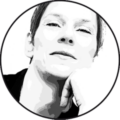- Coffee facts
Sleep thieve? Or not?

Barbara Beiertz
This morning: To make sure that I reach the shower accident-free, a coffee in bed was a must (a huge thank you to my loved one for being so indulgent). After that, another coffee. This time with a bit more leisure and pleasure. When sitting down at my desk: a third one. A cappuccino, as a small reward for the numerous dull researches on organic coffee markets and such. A fourth one – an espresso – after lunch. Number five and six in the afternoon during meetings.
With this amount of coffee, I am way above the average of 1-2 cups a day, according to statistics. The average amount of cups in Luxembourg is even 2.5, but I easily top that, too. Is that the reason for my fitful sleep and my almost nonexistent eyes in the mornings? Probably, when I had my last coffee after 5pm. Coffee or its caffeine has quite a long half-life period. It takes about 6 hours to eliminate half of it. Meaning, if I had an espresso at 5 pm, I would still have half of it in my blood at 11pm. But I haven’t. And I won’t.
Then again: An espresso contains significantly less caffeine compared to a drip coffee, due to the longer roasting time. And: My body is used to a proper dose of coffee. And after all: Alcohol and nicotine are much “worse”, according to scientists at the Florida Atlantic University.* So what is really disturbing my sleep?
What is considered bad sleep?
According to Albrecht Vorster, sleep researcher at the university hospital in Bern, “sleeping badly” is not a phenomenon of a single night, but something that lasts at least for a week.
I am currently doing a study with young athletes in the Swiss Tenero. It does not necessarily seem to be decisive how they slept the night before a tournament. What is crucial, is how someone has slept the week before the tournament (…) Sleeping is individual for every person, like it is with a diet or fluid requirement. There are people who drink a lot and those who don’t drink much. Just like there are people who are short sleepers and only need five or four hours of sleep throughout their whole life. And there are late risers, who need about 9 hours of sleep. But you can say that 90% of the people need something between 6 and 9 hours of sleep. (…) I am more of a late riser. Of course, you can also put me at my desk at 8 in the morning. I would survive that. I am just not as productive at 8 am. (Translated from German)
And how does coffee help with that?
Coffee improves the ability to concentrate. Truck drivers who regularly consume coffee cause fewer accidents. That is why it can clearly be said: Coffee is something good. (Translated from German)
There we go. That’s what I said. But what is the solution to feeling whacked in the mornings? Mr. Vorster has a wonderful idea, I think. He says:
Sleeping and resting are human needs. We create smoking areas because we believe it is a basic right of people to smoke. But it is also an essential fundamental right to sleep. No employer would forbid the employees to drink. No one would say “Everyone can only drink half a liter a day.” But that is basically what we do when it comes to sleeping. We pretend like no one ever needs any sleep during the day. In Japan it is completely normal that people sleep at their workplace. That is considered a great honor. There is even a term for that: Inemuri. That means: Sleeping while being present. When someone sleeps at the office that means that person has worked so much – up to self-sacrifice – that he or she has to sleep for a while to be operational again. Here, someone that sleeps is considered lazy. That should change. (Translated from German)**
All right. My siesta is on for today (and of course the espresso afterwards).
Source:
*www.netdoktor.de/news/von-wegen-kaffee-was-wirklich-den-schlaf-raubt/
**www.zeit.de/arbeit/2022-08/schlafforschung-produktivitaet-schichtarbeit-gesundheit-albrecht-vorster/komplettansicht



